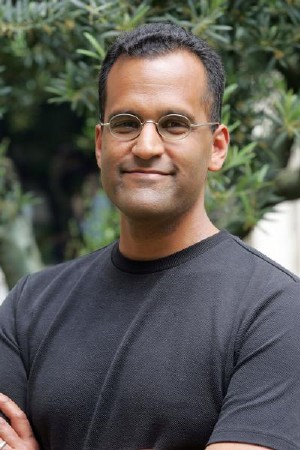Sep 22 2008
A University of California, Berkeley, researcher who studies cellular mechanics and biomaterials is the recipient of a National Institutes of Health (NIH) award honoring innovative new scientists.
 Dr. Sanjay Kumar, UC Berkeley assistant professor of bioengineering. Credit: Manuel Castells
Dr. Sanjay Kumar, UC Berkeley assistant professor of bioengineering. Credit: Manuel Castells
Dr. Sanjay Kumar, assistant professor of bioengineering, is one of 31 recipients of the New Innovator Award, announced today (Monday, Sept. 22) by NIH Director Elias A. Zerhouni. The award recognizes investigators who are in the early stages of their careers and who have not previously held regular research grants from the NIH.
Kumar, 34, will receive $1.5 million over the next five years to support his research program, which combines approaches from biophysics, systems biology and oncology to study how cells sense and process mechanical forces in human health and disease.
"One of the most exciting and relatively recent developments in cell biology is the widespread recognition that these kinds of signals can drive cell behavior in very powerful ways, just as hormones and other soluble chemicals can," said Kumar, who also holds an appointment as a faculty scientist at the Lawrence Berkeley National Laboratory. "This concept has enormous implications for everything from cancer biology to stem cell engineering to the design of human-machine interfaces. This award will enable us to study the molecular mechanisms through which cells process biophysical cues, how these cues activate specific biochemical signaling pathways and gene networks in cells, and how these cues manifest themselves in disease. I'm extremely honored that the NIH has given us this opportunity."
One of Kumar's areas of interest is the development of brain tumors, including malignant gliomas, the most common and aggressive of all primary brain tumors. Such tumors have recently made national headlines, as both Sen. Ted Kennedy and columnist Robert Novak were diagnosed with malignant gliomas. Glioblastoma multiforme, the most severe grade of malignant glioma, carries an average survival time for those diagnosed of 1 to 2 years, even with surgery, radiation and chemotherapy. Unfortunately, this prognosis has only marginally improved over the past two decades.
Kumar and his research group are combining traditional cell biological approaches with cutting-edge micro- and nanoscale engineering tools to understand how mechanical signals influence the development of glioma cells, neural stem cells and other cell types. For example, the researchers are both fabricating biomaterial scaffolds that present cells with defined sets of biophysical cues and genetically manipulating the cells' ability to process these cues.
"We feel this is a promising line of research because it may ultimately lead to the development of new chemotherapeutic drugs that could slow tumor invasion by interfering with the tumor cells' ability to mechanically 'talk' to their surroundings," said Kumar. "In fact, many drugs currently in clinical use for other diseases, such as asthma and high blood pressure, work by changing the mechanical properties of specific cells."
Before joining the UC Berkeley faculty in 2005, Kumar spent two years as an NIH Research Fellow at Children's Hospital Boston and Harvard Medical School. He holds both an M.D. and a Ph.D. in biophysics from Johns Hopkins University.
In addition to announcing the winners of the New Innovator Award, now in its second year, the NIH announced 16 Pioneer Awards. The grants for both programs total $138 million over five years and are key components of the NIH Roadmap for Medical Research, a series of initiatives designed to address fundamental knowledge gaps, develop transformative tools and technologies, and foster innovative approaches to complex problems.
"These highly creative researchers are tackling important scientific challenges with bold ideas and inventive technologies that promise to break through barriers and radically shift our understanding," said Dr. Elias A. Zerhouni, director of the NIH. "These programs are central elements of NIH efforts to encourage and fund especially novel investigator-initiated research, even if it might carry a greater-than-usual degree of risk of not succeeding. The awards also reflect our goal of supporting more investigators in the early stages of their careers."